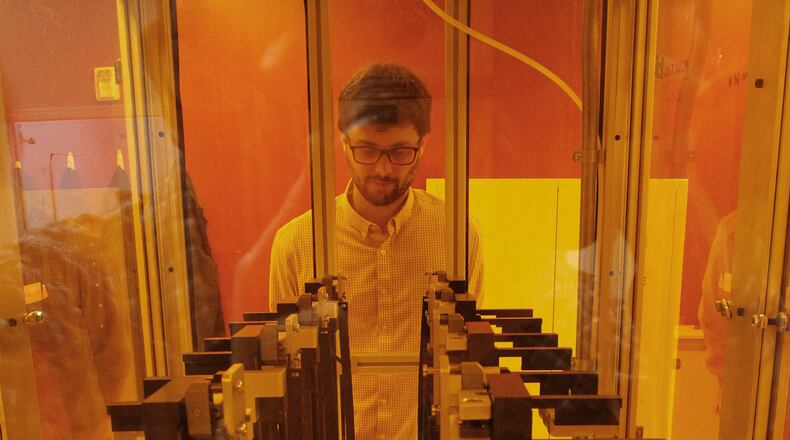In fact, Dayton businesses are AFRL’s 4th largest recipient of SBIR/STTR (small business innovation research/small business technology transfer) awards in the U.S.
RELATED: FAA drone waiver adds to region's reputation as aerospace innovator
“We are looking for risky solutions,” William Harrison III, AFRL small business development director, told the “Think Regional” summit at Austin Landing Friday. “We will take risks most investors won’t take.”
The Think Regional event focused on how to unite business, government and educators to create growth across Southwestern Ohio.
AFRL commands a $5 billion research and development budget, and although it has a presence across the nation, Wright-Patterson Air Force Base, its headquarters, is its biggest location.
“Take out your iPhones,” Harrison told his audience at the Hilton Garden Inn. “This is full of AFRL technology.”
RELATED: Navy updates guidelines for UFO reporting; what about the Air Force?
Siri’s voice software, for example, was developed in AFRL’s Rome, N.Y. labs, he said.
Five years ago, Harrison said AFRL committed to a change in culture, wanting to work more cooperatively with small businesses.
Harrison met Kim Frazier, director of growth initiatives for The Entrepreneurs Center in Dayton, who was experiencing her own frustrations.
Dayton incomes were lagging national incomes, even as Wright Patterson and AFRL thrived next door as research powerhouses.
“I was trying to make connections happen,” Frazier said, joining Harrison in the event’s joint keynote address.
AFRL was rooted in a “hierarchical” military culture, which stymied innovation and the sharing of information, Frazier said. “What we needed was a network.”
The idea was simple. Paraphrasing Scott Koorndyk, president of The Entrepreneurs Center, Frazier said: “If we lob it over the (Wright-Patterson) fence, someone has to catch it.”
So far, local businesses like Mile Two and Battlesight Technologies — and many others — are “catching” AFRL ideas.
Before, landing federal contracts or licensing military technologies to privatize could take months. Now businesses can make a pitch before Air Force scientists and win a contract in a day, Harrison said. Some businesses can walk away from pitch events with $50,000, he said.
The inaugural Air Force “Pitch Day” was early March in New York City, he said. The next is slated for the fall of 2019, in Los Angeles, focusing on space-oriented technologies.
Dayton has its own local pitch events and gatherings, including Techstars Startup Week, slated for June 3-7 at The Steam Plant, 617 E Third St., Dayton. (For more information, visit https://dayton.startupweek.co/.)
In all, the Ohio ESP (Entrepreneurial Services Provider) program based at The Entrepreneurs Center — which has announced that it will move to the Dayton Arcade — has 83 portfolio companies, 65 of which are active, with 284 full-time and 214 part-time workers.
“We’re finally getting some leverage,” Frazier said.
About the Author

